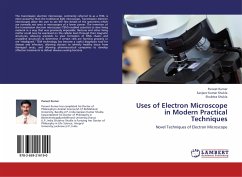The transmission electron microscope, commonly referred to as a TEM, is more powerful than the traditional light microscope. Transmission electron microscopes allow the user to see the fine details of the specimens which are normally not seen in microscopes of a lower power. The invention of the transmission electron microscope (TEM) enabled scientists to view living material in a way that was previously impossible. Bacteria and other living matter could now be examined on the cellular level through their magnetic structures, allowing scientists to view formation of DNA chains and crystalline structures to determine if certain cells are forming properly or are "misaligned." TEM technology has become a useful diagnostic tool for disease and infection, allowing doctors to identify healthy tissue from damaged areas, and allowing pharmaceutical companies to develop affective treatments to defeat disease-causing bacteria.
Bitte wählen Sie Ihr Anliegen aus.
Rechnungen
Retourenschein anfordern
Bestellstatus
Storno








